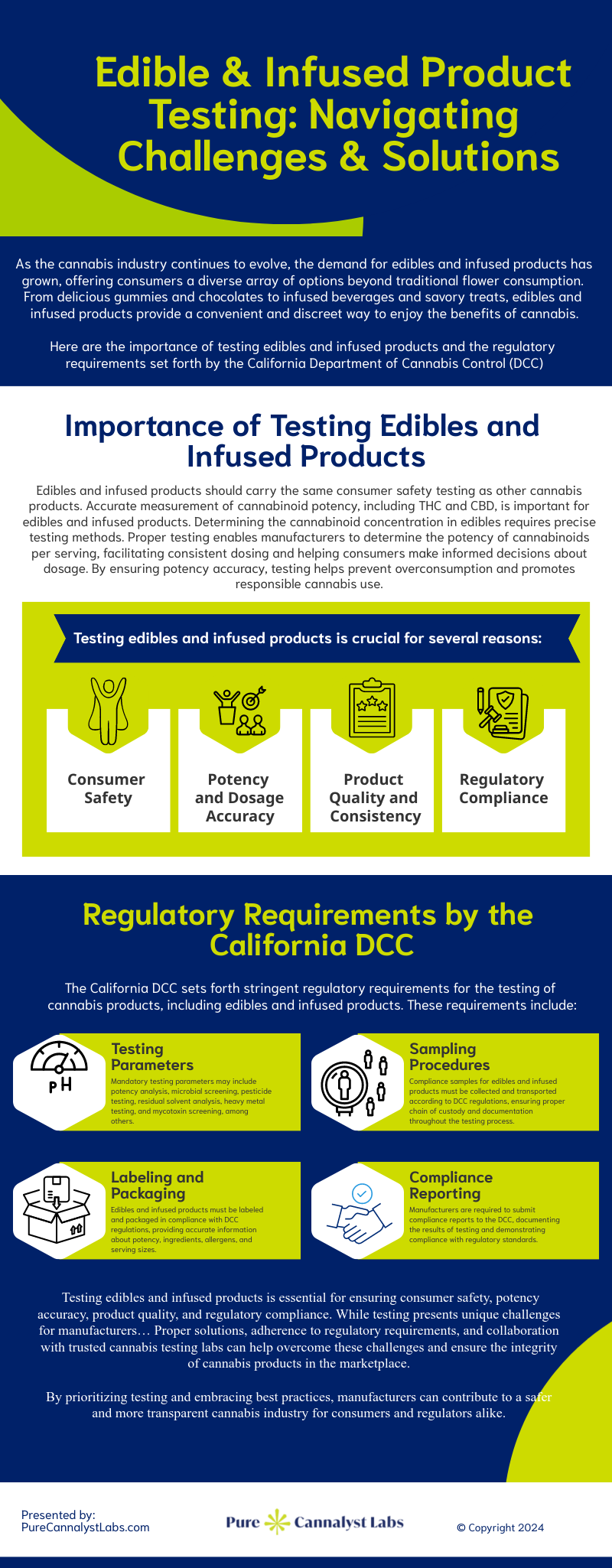As the cannabis industry continues to evolve, the demand for edibles and infused products has grown, offering consumers a diverse array of options beyond traditional flower consumption. From delicious gummies and chocolates to infused beverages and savory treats, edibles and infused products provide a convenient and discreet way to enjoy the benefits of cannabis. However, ensuring the safety, potency, and quality of these products requires thorough testing, presenting unique challenges for manufacturers. In this blog post, we’ll explore the importance of testing edibles and infused products, why testing sometimes gets overlooked, the unique challenges involved, and proper solutions for manufacturers, all while considering the regulatory requirements set forth by the California Department of Cannabis Control (DCC).
Table of Contents
ToggleImportance of Testing Edibles and Infused Products
Edibles and infused products should carry the same consumer safety testing as other cannabis products. Accurate measurement of cannabinoid potency, including THC and CBD, is important for edibles and infused products. Determining the cannabinoid concentration in edibles requires precise testing methods. Proper testing enables manufacturers to determine the potency of cannabinoids per serving, facilitating consistent dosing and helping consumers make informed decisions about dosage. By ensuring potency accuracy, testing helps prevent overconsumption and promotes responsible cannabis use.
Testing edibles and infused products is crucial for several reasons:
- Consumer Safety: Edibles and infused products are consumed orally, which means they undergo a different metabolic process compared to inhaled cannabis. Proper testing safeguards consumer health and ensures that these products are free from contaminants such as pesticides, heavy metals, and microbial pathogens. By ensuring that these products meet stringent safety standards, testing plays a vital role in maintaining consumer trust and confidence in the cannabis industry.
- Potency and Dosage Accuracy: Accurately measuring the potency of cannabinoids, such as THC and CBD, in edibles and infused products is essential for ensuring consistent dosing and avoiding overconsumption. Testing helps manufacturers determine the concentration of cannabinoids per serving, enabling consumers to make informed decisions about dosage.
- Product Quality and Consistency: Testing verifies the quality and consistency of edibles and infused products, ensuring they meet the manufacturer’s specifications and regulatory standards. Consistent testing helps maintain product integrity and brand reputation. As the cannabis industry continues to expand, consistency is key to delivering a superior consumer experience in the cannabis market. Consistent testing practices ensure that each batch of products meets the manufacturer’s specifications, preserving product integrity and enhancing brand reputation.
- Regulatory Compliance: Regulatory agencies, such as the DCC, require cannabis products, including edibles and infused products, to undergo testing to ensure compliance with state regulations. Adhering to these requirements is essential for legal market access and consumer trust. In a regulated market like California, compliance with state regulations is non-negotiable for cannabis businesses. By demonstrating compliance with regulatory standards, manufacturers uphold the integrity of the cannabis industry and contribute to its legitimacy and credibility.
Why Testing for Edibles and Infused Products Sometimes Gets Overlooked
Despite the importance of testing, edibles and infused products sometimes get overlooked for several reasons:
- Perceived Complexity: Testing edibles and infused products can be more complex than testing flowers or concentrates due to the diverse matrices and formulations involved. Some manufacturers may perceive testing as time-consuming or costly, leading them to prioritize other aspects of production.
- Lack of Awareness: In some cases, manufacturers may not fully understand the regulatory requirements for testing edibles and infused products or the potential risks associated with non-compliance. This lack of awareness can lead to oversight or neglect of testing obligations.
- Resource Constraints: Smaller or newer cannabis businesses may face resource constraints, such as limited budgets or access to a Los Angeles cannabis testing lab. These constraints can hinder their ability to prioritize testing for edibles and infused products.
Unique Challenges for Consistent Testing
Testing edibles and infused products is more complex than testing cannabis flowers and presents unique challenges for manufacturers, including:
- Homogeneity: Achieving homogeneity in infused products, such as baked goods or beverages, can be challenging, leading to uneven distribution of cannabinoids. Proper mixing techniques and formulation adjustments can help ensure consistent potency throughout the product.
- Matrix Interference: The complex matrices of edibles and infused products can interfere with testing methods, affecting the accuracy of results. Validating testing methods for specific product matrices and using appropriate sample preparation techniques can mitigate matrix interference.
- Sample Preparation: Proper sample preparation is essential for extracting cannabinoids and contaminants from edible matrices. Manufacturers must carefully follow validated sample preparation protocols to ensure accurate and reliable test results.
- Labeling and Packaging: Regulatory requirements for labeling and packaging of edibles and infused products must be carefully followed to provide consumers with accurate information about potency, ingredients, and serving sizes. Properly labeled and packaged products help ensure compliance and consumer safety.
Regulatory Requirements by the California DCC
The California DCC sets forth stringent regulatory requirements for the testing of cannabis products, including edibles and infused products. These requirements include:
- Testing Parameters: Mandatory testing parameters may include potency analysis, microbial screening, pesticide testing, residual solvent analysis, heavy metal testing, and mycotoxin screening, among others.
- Sampling Procedures: Compliance samples for edibles and infused products must be collected and transported according to DCC regulations, ensuring proper chain of custody and documentation throughout the testing process.
- Labeling and Packaging: Edibles and infused products must be labeled and packaged in compliance with DCC regulations, providing accurate information about potency, ingredients, allergens, and serving sizes.
- Compliance Reporting: Manufacturers are required to submit compliance reports to the DCC, documenting the results of testing and demonstrating compliance with regulatory standards.
Testing edibles and infused products is essential for ensuring consumer safety, potency accuracy, product quality, and regulatory compliance. While testing presents unique challenges for manufacturers… Proper solutions, adherence to regulatory requirements, and collaboration with trusted cannabis testing labs can help overcome these challenges and ensure the integrity of cannabis products in the marketplace. By prioritizing testing and embracing best practices, manufacturers can contribute to a safer and more transparent cannabis industry for consumers and regulators alike.
Infographic

